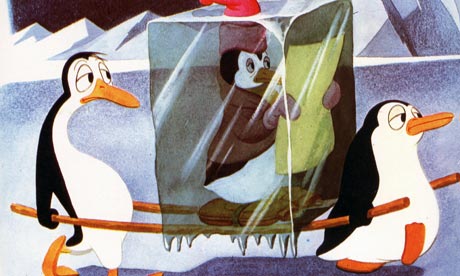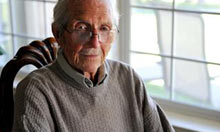
Del Connell’s story The Cold-Blooded Penguin, featuring Pablo the penguin (centre), formed a sequence in Disney’s The Three Caballeros.
One night in the 1960s, at the height of the US-Soviet space race, a middle-aged comic-book writer, Del Connell, stood in his backyard in California watching one of the regular rocket tests by Nasa's Saturn engine suppliers, Rocketdyne, and had a thought. How would it be if a 20th-century family were, in the manner of the Swiss Family Robinson, cast away in space? The first issue of his Space Family Robinson was published in December 1962. Three years later, the idea was reborn – with the Robinsons, but without attribution to Connell – as Irwin Allen's successful television show Lost in Space, which ran for three seasons and in its turn inspired a 1998 feature film.
It is characteristic of the work of Connell, who has died aged 93, that, despite having written thousands of the comic strips and books that were the regular reading matter for a generation of youngsters in America and around the world, his name is virtually unknown.

It is characteristic of the work of Connell, who has died aged 93, that, despite having written thousands of the comic strips and books that were the regular reading matter for a generation of youngsters in America and around the world, his name is virtually unknown.

Del Connell
He was born in Sixteen Mile Stand, Ohio, to George Connell and Flora Kroetzch, but his family moved the following year to Los Angeles, where he grew up with a brother and two sisters, attending South Pasadena high school and graduating from Pasadena Junior College as an art student.
In 1939, responding to a newspaper advertisement for artists, Connell joined the Walt Disney Studio and was assigned to the all-important character model department, where he sculpted models to provide three-dimensional reference for the animators drawing the two-dimensional characters in such films as Fantasia, Dumbo, The Reluctant Dragon and Lady and the Tramp.
Connell also served as a writer on the early development of Disney's version of Alice in Wonderland before being drafted into the US army in 1941. Serving in Panama, he made detailed maps of the canal, while maintaining his association with Disney by contributing story ideas that later made their way on to film, notably the cartoon short The Pelican and the Snipe (1944) and The Cold-Blooded Penguin, which told the story of Pablo, a penguin who deserts the south pole in favour of warmer climes. The story, which earned Connell $500, formed a sequence in Disney's The Three Caballeros (1944).
Returning to the studio in 1945, he rejoined the writing team for Alice in Wonderland (1951), and worked on an abandoned version of The Pied Piper of Hamelin and the Oscar-nominated cartoon short Ben and Me (1953), about a humble house mouse who inspires Benjamin Franklin to greatness. In 1955, he also wrote and sketched the earliest drafts for the first souvenir guide to Disneyland.
In 1954, Connell began a 30-year career at the Western Publishing company, writing and editing thousands of stories for comic books for various studios including Warner Bros, Hanna-Barbera, MGM and Walter Lantz, whose characters included Chilly Willy, a not-so-distant penguin relative of his own Pablo.
For Disney, he created several new, exclusively comic-book characters, such as Daisy Duck's nieces, April, May and June, and Supergoof, Goofy's superhero alter ego who carries out his missions clad in red flannel long-johns. Other original comic-book creations included Mighty Knight, Wacky Witch and The Close Shaves of Pauline Peril.
As editor-in-chief of the west coast office of Western Publishing, Connell continued his relationship with Disney, and from 1968, for 20 years, wrote and sketched the daily Mickey Mouse strip that kept Disney's most famous character in the public gaze long after the decline of his screen career. Although, like all comic-book writers and artists, Connell's talents went uncredited – being subsumed into the corporate persona represented by the iconic Disney signature – his original pencil drawings and proof sheets of the Mickey Mouse strip now reside in the UCLA special collections at the Charles E Young Research Library.
In retirement, Connell devoted his talents to the creation of the Historables, a project aimed at teaching children about history, currently being developed for the internet and a television show. In July this year, at the San Diego Comic-Con convention, Connell received the Bill Finger award for excellence in comic-book writing, named after the uncredited co-creator of Batman and given for comic-book writers insufficiently honoured for their work. As the chair of the judges, the writer Mark Evanier, observed, the award to Connell was "one of the few times in his amazing career he ever had his name on anything".
He is survived by Ruth, his wife of 61 years, his children, Kelly, Casey and Brady, and four grandchildren.
• Del George Connell, film and comic book writer, born 7 June 1918; died 12 August 2011
In 1939, responding to a newspaper advertisement for artists, Connell joined the Walt Disney Studio and was assigned to the all-important character model department, where he sculpted models to provide three-dimensional reference for the animators drawing the two-dimensional characters in such films as Fantasia, Dumbo, The Reluctant Dragon and Lady and the Tramp.
Connell also served as a writer on the early development of Disney's version of Alice in Wonderland before being drafted into the US army in 1941. Serving in Panama, he made detailed maps of the canal, while maintaining his association with Disney by contributing story ideas that later made their way on to film, notably the cartoon short The Pelican and the Snipe (1944) and The Cold-Blooded Penguin, which told the story of Pablo, a penguin who deserts the south pole in favour of warmer climes. The story, which earned Connell $500, formed a sequence in Disney's The Three Caballeros (1944).
Returning to the studio in 1945, he rejoined the writing team for Alice in Wonderland (1951), and worked on an abandoned version of The Pied Piper of Hamelin and the Oscar-nominated cartoon short Ben and Me (1953), about a humble house mouse who inspires Benjamin Franklin to greatness. In 1955, he also wrote and sketched the earliest drafts for the first souvenir guide to Disneyland.
In 1954, Connell began a 30-year career at the Western Publishing company, writing and editing thousands of stories for comic books for various studios including Warner Bros, Hanna-Barbera, MGM and Walter Lantz, whose characters included Chilly Willy, a not-so-distant penguin relative of his own Pablo.
For Disney, he created several new, exclusively comic-book characters, such as Daisy Duck's nieces, April, May and June, and Supergoof, Goofy's superhero alter ego who carries out his missions clad in red flannel long-johns. Other original comic-book creations included Mighty Knight, Wacky Witch and The Close Shaves of Pauline Peril.
As editor-in-chief of the west coast office of Western Publishing, Connell continued his relationship with Disney, and from 1968, for 20 years, wrote and sketched the daily Mickey Mouse strip that kept Disney's most famous character in the public gaze long after the decline of his screen career. Although, like all comic-book writers and artists, Connell's talents went uncredited – being subsumed into the corporate persona represented by the iconic Disney signature – his original pencil drawings and proof sheets of the Mickey Mouse strip now reside in the UCLA special collections at the Charles E Young Research Library.
In retirement, Connell devoted his talents to the creation of the Historables, a project aimed at teaching children about history, currently being developed for the internet and a television show. In July this year, at the San Diego Comic-Con convention, Connell received the Bill Finger award for excellence in comic-book writing, named after the uncredited co-creator of Batman and given for comic-book writers insufficiently honoured for their work. As the chair of the judges, the writer Mark Evanier, observed, the award to Connell was "one of the few times in his amazing career he ever had his name on anything".
He is survived by Ruth, his wife of 61 years, his children, Kelly, Casey and Brady, and four grandchildren.
• Del George Connell, film and comic book writer, born 7 June 1918; died 12 August 2011
No comments:
Post a Comment